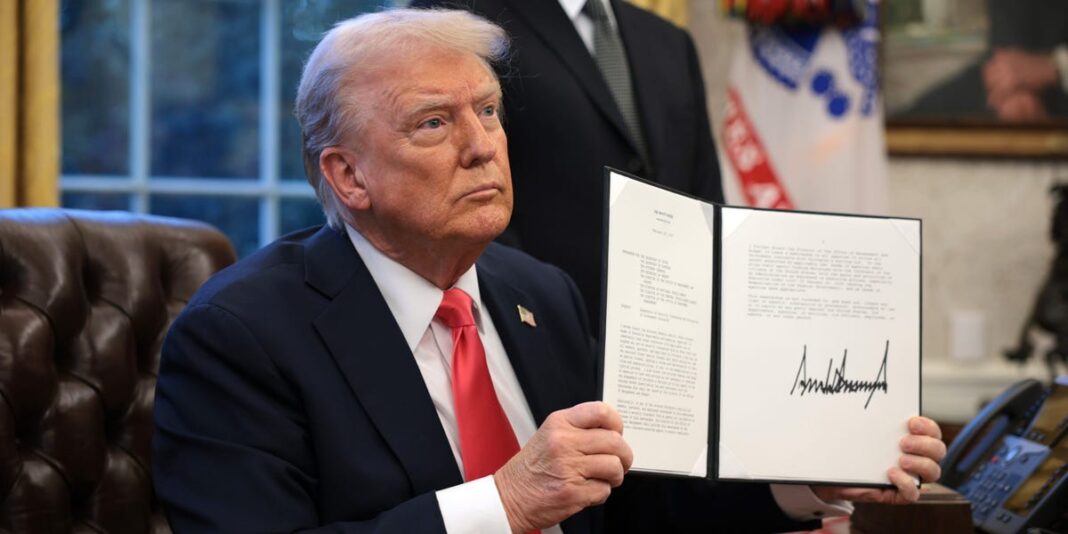“The Trump Era: Big Law’s Battle Lines Are Drawn – A Clash of Corporate Giants, Ambition, and Power
The battle for talent and influence in the corporate law world has been brewing since the 2016 presidential election. Since then, a high-stakes showdown has been unfolding between top firms and Donald Trump’s inner circle, with some of the biggest names in Big Law caught in the middle.

Firms That Have Made Deals with the President
Paul Weiss: The Agreement and Its Implications
The Rescinded Executive Order and the Pro Bono Deal
On March 14, Trump issued an executive order directed at the prominent New York City-based law firm Paul Weiss, where he railed against the attorney Mark Pomerantz and decried what he said was “unlawful discrimination” from diversity, equity, and inclusion initiatives at the firm. Pomerantz previously left Paul Weiss to aid the Manhattan District Attorney’s office as it probed Trump’s finances. When Pomerantz resigned as special district attorney in February 2022, he wrote in a departing letter that he believed Trump was “guilty of numerous felony violations.”
In the order, Trump sought to revoke security clearances and bar access to government buildings for attorneys of the firm. Such a sweeping directive could also include federal courthouses, a scenario that would be detrimental to the firm’s work. However, Trump just days later rescinded the executive order and announced an agreement with Paul Weiss chairman Brad Karp.
Trump said the firm would provide $40 million in pro bono work for causes that the administration supports and end its DEI policies. Karp received a heap of criticism, with many questioning why Paul Weiss didn’t challenge Trump’s order.
In an email to the firm’s attorneys, he said there was a desire from the outset to challenge the directive. In the same email, though, Karp argued that even if Paul Weiss won in court, it would become “persona non grata” with the Trump White House, which could prompt a wave of clients to switch to other firms and subsequently threaten the viability of the firm.
“It was very likely that our firm would not be able to survive a protracted dispute with the administration,” Karp wrote in the email.
Criticism and Controversy Surrounding the Firm’s Decision
Many questioned why Paul Weiss didn’t challenge Trump’s order, and the decision sparked intense debate within the legal community.
Some argued that the firm’s decision to cave to Trump’s demands would undermine its commitment to diversity and inclusion, while others saw it as a pragmatic move to protect the firm’s business interests.
Other Firms That Have Reached Agreements: A Closer Look
The Terms of the Deals and Their Consequences
Perkins Coie On March 6, Trump targeted the law firm Perkins Coie, issuing an executive order to suspend the security clearances of the firm’s attorneys and criticizing its diversity and inclusion policies.
In the order, Trump called out what he said was the firm’s “dishonest and dangerous activity.”
The president, in his order, highlighted the firm’s representation of former Secretary of State Hillary Clinton — his rival in the 2016 presidential election.
Whether they’re on the ropes or down for the count, here are the firms Trump is taking on, how they’ve responded, and where the legal process stands for those who have challenged him in court.
Firms That Are Refusing to Back Down
Perkins Coie: The Firm’s Response to the Executive Order
Perkins Coie, a prominent law firm, has been directly targeted by President Donald Trump through an executive order. The order, issued on March 6, suspends the security clearances of the firm’s attorneys and criticizes its diversity and inclusion policies. Trump’s order describes the firm’s activities as “dishonest and dangerous,” highlighting its representation of former Secretary of State Hillary Clinton, his rival in the 2016 presidential election.
The firm’s response to the executive order has been firm, with allegations of “dishonest and dangerous activity” being strongly denied. Perkins Coie has made it clear that it will not back down in the face of the president’s actions, and is prepared to take all necessary steps to protect its clients and employees. The potential consequences of defying the president are significant, and the firm is likely to face further punitive measures if it continues to resist the executive order.
Covington & Burling and WilmerHale: Their Stance and Strategies
Covington & Burling and WilmerHale, two other major law firms, have also been targeted by Trump’s executive orders. The firms have issued statements and taken actions in response to the orders, with a focus on protecting their clients and employees. The firms’ statements and actions demonstrate a commitment to upholding the law and defending their rights, even in the face of presidential pressure.
The legal and business ramifications of the firms’ decisions are significant. By refusing to back down, the firms are taking a strong stance against the president’s actions, and are likely to face further challenges and obstacles. However, the firms are also demonstrating their commitment to the rule of law and the protection of their clients’ interests, which is essential for maintaining trust and confidence in the legal profession.
- Covington & Burling has stated that it will continue to represent its clients to the best of its ability, despite the president’s actions.
- WilmerHale has also affirmed its commitment to upholding the law and defending its clients’ rights.
- Both firms have emphasized the importance of maintaining the integrity of the legal profession and protecting the rights of their clients.
The Legal Process and Implications
The Lawsuits and Legal Challenges: A Status Update
The lawsuits and legal challenges filed by the law firms against the president’s executive orders are ongoing. The firms have alleged free speech violations and unfair targeting by the president, and are seeking to have the orders overturned. The potential outcomes and implications of these lawsuits are significant, and could have far-reaching consequences for the legal industry and the broader business community.
The firms’ allegations of free speech violations and unfair targeting are based on the president’s actions, which they argue are intended to chill free speech and deter clients from doing business with them. The potential outcomes of the lawsuits could include the overturning of the executive orders, as well as damages and other relief for the firms and their clients.
The Broader Implications for the Legal Profession and Clients
The broader implications of the president’s actions and the law firms’ responses are significant. The impact on attorney-client privilege and confidentiality could be particularly severe, as the president’s orders could be seen as an attempt to intimidate and silence lawyers and their clients. The potential consequences for business and commerce are also significant, as the president’s actions could create uncertainty and instability in the legal and business communities.
The law firms’ commitment to upholding the law and defending their clients’ rights is essential for maintaining trust and confidence in the legal profession. By refusing to back down in the face of presidential pressure, the firms are demonstrating their commitment to the rule of law and the protection of their clients’ interests. The outcome of the lawsuits and the broader implications of the president’s actions will be closely watched by the legal and business communities, and could have significant consequences for the future of the legal profession and the business community.
- The president’s actions could create uncertainty and instability in the legal and business communities.
- The law firms’ commitment to upholding the law and defending their clients’ rights is essential for maintaining trust and confidence in the legal profession.
- The outcome of the lawsuits and the broader implications of the president’s actions will be closely watched by the legal and business communities.
Conclusion
As the Trump-Big Law fight continues to unfold, one thing is clear: the future of corporate law is on the line. The article “Here’s where all the firms in the Trump-Big Law fight stand” has provided a comprehensive overview of the current state of play, highlighting the key alliances and rivalries between major law firms. From the breakaway group of firms led by Morgan Lewis, to the loyalist firms that have stood by Trump, it’s clear that the stakes are high. The article has also shed light on the motivations behind each firm’s stance, from the desire to protect clients to the fear of losing market share.
The significance of this topic extends far beyond the realm of corporate law. The Trump-Big Law fight is a microcosm of the broader tensions between powerful special interests and the rule of law. As the article has shown, the actions of major law firms have real-world implications for the way businesses operate and the way the law is enforced. As the fight continues to unfold, it’s likely that we’ll see further shake-ups and realignments in the corporate law landscape. But one thing is certain: the outcome will have far-reaching consequences for the country as a whole.
Ultimately, the Trump-Big Law fight is a reminder that the interests of the powerful and the interests of the people are not always aligned. As we move forward, it’s essential that we hold those in power accountable and ensure that the law is applied fairly and evenly. The fate of corporate law hangs in the balance, but the real question is: what kind of country do we want to be? Will we be a nation ruled by the whims of the powerful, or a nation that upholds the rule of law for all? The answer will be written in the coming months and years, and it’s up to us to shape the outcome.
